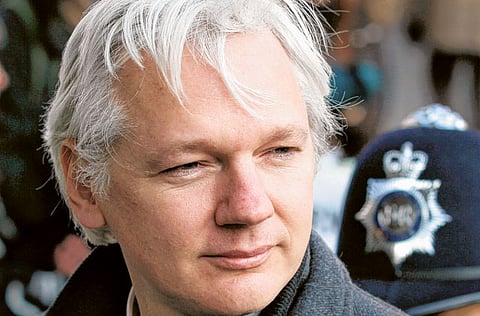Ecuador president vows to take time on Assange decision
Scotland Yard says WikiLeaks founder has breached his bail conditions

London: Ecuador’s president said on Thursday his government would take its time in deciding whether to grant asylum to Julian Assange as the WikiLeaks founder spent a third day at its embassy in London.
The 40-year-old Australian sparked a stand-off with British police after he turned up in the embassy on Tuesday and asked for asylum in a dramatic bid to avoid extradition to Sweden over allegations of rape and sexual assault.
Scotland Yard says the whistle-blowing website founder has breached his bail conditions and is now subject to arrest. The London police headquarters said there was no change in the situation from Wednesday.
Ecuador’s deputy foreign minister Marco Albuja said that President Rafael Correa would give his instructions within 24 hours, but Correa later indicated a longer timeframe was possible.
“He [Assange] presented his reasons. We are going to verify them... We will take the time necessary,” Correa told AFP, adding that it would be done “with absolute seriousness and absolute responsibility.”
The leftist leader, who has often been at odds with Washington, said his government was studying Assange’s claim that he could be extradited from Sweden to the United States on political grounds and possibly sentenced to death.
“Ecuador is a country which defends the right to life. We have to see whether there is a threat to Julian Assange’s life,” Correa said on the sidelines of the Rio+20 summit on sustainable development.
An AFP photographer said three policeman stood guard on Thursday outside Ecuador’s embassy in the upscale Knightsbridge area of central London.
The diplomatic mission is a flat in a mansion block opposite the famed Harrods department store.
Another two plainclothes officers sat in a car that carried a small police badge in the windscreen.
Britain’s Supreme Court last week threw out Assange’s application to reopen his appeal against extradition to Sweden after a marathon legal battle.
He has until June 28 to lodge an appeal at the European Court of Human Rights in Strasbourg, after which the extradition process can begin.
The asylum bid is the most dramatic twist yet in a case dating back to December 2010, when Assange was first detained in London on a European arrest warrant.
Anna Alban, the Ecuadorian ambassador, said in a statement on Wednesday that she had held “cordial and constructive” talks about the asylum request with Britain’s Foreign Office.
“I also emphasised to the UK government that it was not the intention of the Ecuadorian government to interfere with the processes of either the UK or Swedish governments,” she added.
Sign up for the Daily Briefing
Get the latest news and updates straight to your inbox



